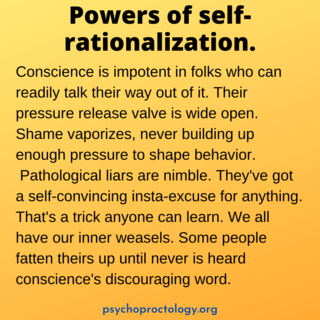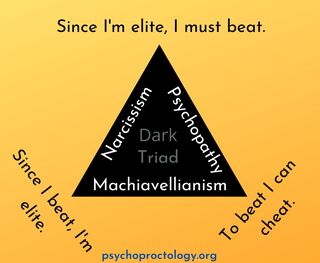Defense Mechanisms
Is It Weak Conscience or Strong Self-Rationalization?
Consciences are impotent when we get very good at self-rationalization.
Posted December 30, 2021 Reviewed by Abigail Fagan
Key points
- What seems a weak conscience may be a strong capacity for self-rationalization that assuages it.
- A behavior is really the product of appetites and what we can get away with internally and externally.
- One can fall into a culture that encourages and promotes self-rationalization.
You and your friend both have a sweet tooth but you eat more sweets than they do. Why? Maybe your sweet tooth is bigger or maybe you’re just better at justifying eating more sweets. Or maybe you’re around more sweets. Or maybe you’re around people who are good at rationalizing pigging out on them.
You and your ex have consciences but your ex demonstrates far less of it than you do. Maybe it’s because they have less conscience than you do. Or maybe they’re just better at self-rationalizing their way out of it. Or maybe they’re around more temptations to be nasty. Or maybe they had allies who encouraged their unconscientious behavior.
It’s far too easy to think of behavioral traits like “sweet tooth” or “conscience” as a thing one has to one degree or another. It’s more complicated, though not by a lot.
We all have external and internal tendencies and constraints. Picture it like driving. The available roads are external tendencies — the paths available. The road’s edges and barriers are external constraints — the don’t-, can’t-, or shouldn’t go there’s.
But we’re not passive trains rolling down a railroad track. Driving, we have our impulses and self-discipline, our inclinations and our self-control.
So, for example, if you eat more sweets than other people, you might have a big old “sweet tooth,” but that’s not the only possible explanation.
Internal tendency: A stronger sweet-tooth impulse.
Internal constraint: Less self-control, for example, more capacity for rationalizing eating sweets.
External tendency: Easier access to sweets.
External constraint: Less social discouragement.
We tend to think of conscience as something people have or lack to one degree or another, but again, it’s not that simple. It’s possible to have a strong conscience but less self-control. And why less self-control? It could be that they have stronger powers of self-rationalization.
Internal tendency: Stronger unconscientious impulses.
Internal constraint: Stronger powers of self-rationalization.
External tendency: Greater opportunities to get away with unconscientious behavior.
External constraint: Greater social encouragement for self-rationalization.
Pathological liars can invent a justification for anything in an instant. It’s a creative and self-benefiting talent. If they need an excuse they can always make one up instantly.

They might even have as much conscience as the next person but from their behavior you wouldn’t know it. Their conscience never builds up enough guilt or shame to constrain their behavior. Their powers of self-rationalization are like a pressure release valve wide open. When they need a self-rationalization they’ve got one. Conscience grips and their inner weasel greases them a way right out of it.
We all have our inner weasel, that voice that resists resisting temptation, that voice that says “No, it’s OK, go ahead. Have another Oreo or dozen.” Our appetites welcome these rationalizations, at least in the moment. Our inner weasels can drown conscience right out so we’ll go whatever we want.
We can fall into a culture that enables such self-rationalization, really fattening up our inner weasel. There are lots of such cultures on offer. They can be as local as an informal chub club that encourages overeating or as large as a national or international movement that encourages dark-triad pan-anarchy whereby one can justify acting on any impulse by means of a circular argument:

Since I’m elite (by any locally popular standard) I must beat.
To beat I can cheat (including claiming I’ve won when I’ve lost)
Since I beat I’m elite.
Round and round the circular argument goes, generating self-rationalizations that fatten the inner weasel right up. The conscience may still be there but it doesn’t matter. It’s impotent drowned out by insta-self-rationalization.
Or to switch metaphors, people can end up driving guilt-free anywhere as though all paths are open, no constraints. And if they run people over, so what? Their inner weasel always rationalizes it and their back seat drivers applaud the self-rationalization.
References
Sherman, J (2021). What's Up with A**Holes?: How to spot and stop them without becoming one. Berkeley, CA: Evolving Press


